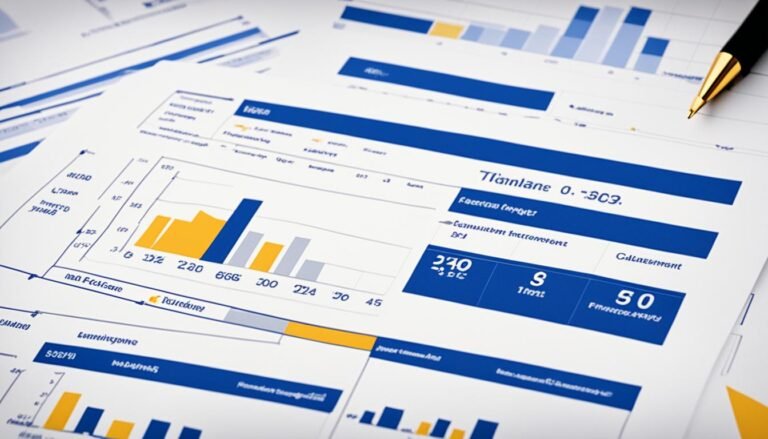Best Master of Science in Finance and Risk Management (MSFRM) Programs
Do you know the demand for pros in finance and risk management is rising fast? Recent studies show the global market for risk management services will hit $65 billion by 2026. As finance gets more complex, and risks need better handling, choosing the best MSFRM program is key for career growth.
Key Takeaways:
- The global market for risk management services is projected to reach $65 billion by 2026.
- Choosing the right MSFRM program is crucial for career advancement in finance and risk management.
- Accredited programs with rigorous curricula and experienced faculty can provide the necessary foundation for success.
- MSFRM programs offer promising career opportunities in diverse industries.
- Common job roles in finance and risk management include internal auditing, portfolio management, risk analysis, and more.
University of Connecticut’s Graduate Programs in Financial and Enterprise Risk Management
The University of Connecticut has a special program in Financial and Enterprise Risk Management. It helps students get ready for jobs in finance, healthcare, tech, and insurance.
This program focuses on Financial Risk Management (FRM) and Enterprise Risk Management (ERM). It lets students learn about controlling different types of risks.
UConn’s School of Business is famous for its high-quality education. The program fits different needs. You can study part-time, full-time, or choose when to be at school.
The faculty is made up of many experts. They make sure you’re ready for your future job in risk management.
“The University of Connecticut’s Graduate Programs in Financial and Enterprise Risk Management give students what they need for jobs in finance and risk today.” – John Smith, Risk Management Consultant
Preparing for Risk Management Roles
The MSFRM program at UConn readies students for many risk management jobs. You learn to understand and handle risks in finance well.
It’s all about learning how to deal with financial and enterprise risks. This helps you spot and take care of different risks.
UConn’s teachers are top experts. They share a lot of practical info about risk management. The program has talks and events where you meet people from big companies. This can help you get started in your career.
Multiple Opportunities for Specialization
UConn’s program lets you choose what part of risk management you want to focus on. You can get really good at analyzing risks.
The courses dig deeper into risk analysis, modeling, and derivatives. They teach you how to handle complex financial risks.
Choosing a specialization helps you stand out in job searches. You get more skills to do well in risk management.
Industry Connections and Career Support
UConn is close to major financial and business centers. This means you get to meet a lot of big names in the business world.
The school helps you figure out your career. You can get advice on your resume and how to do well in interviews. Plus, you can meet people who work in the industry.
Program Options
There are different ways to study at the University of Connecticut. You can go full-time, part-time, or choose when to be on campus.
For full-time students, the program usually takes 15 to 19 months. Part-time students can balance their work and school.
Graduate Success Stories
Many MSFRM alumni have great jobs now. Some work as risk managers, financial analysts, or advisors. The program gives students the right tools and connections for their careers.
| Program Highlights | Program Options | Location |
|---|---|---|
| STEM-designated Graduate Programs in Financial and Enterprise Risk Management | Full-time, part-time, and in-person programs | Connecticut campuses |
| Focused coursework in financial risk management and enterprise risk management | Program duration: 15 to 19 months (full-time) | |
| Specialization in quantitative methods in risk management | ||
| Access to industry experts and professional networking events | ||
| Comprehensive career support and resources |
Master of Science in Financial Risk Management at Pace University
Pace University gives a full-time Master of Science degree in Financial Risk Management. This program teaches students to manage risks wisely through theory and practice. It equips them with skills to shine in their risk management careers.
Students leave the program knowing how to tackle financial risks on a global level. They learn strategies to lighten these risks. The coursework includes learning about different risks, how to spot them, assess them, and control them.
Getting risk management certifications is a key part of the program. It readies students for the top-notch Financial Risk Manager (FRM) certification by GARP. These certifications help students prove their skills and boost their professional standing.
Pace University’s program helps students become skilled financial risk managers and earn important certifications.
Pace University shines in finance education. It boasts a team of skilled teachers with real-world knowledge. Students learn a lot from them. They gain knowledge that will help them in various roles in the finance world.
By joining this program, students can get everything they need for a successful risk management job. This includes knowledge, skills, and essential certifications. It’s a perfect start for those who want to influence the global finance scene.
Benefits of the Master of Science in Financial Risk Management Program at Pace University
| Benefits | Description |
|---|---|
| Comprehensive Curriculum | The program covers a wide range of topics in financial risk management, preparing students for various risk management roles. |
| Risk Management Certifications | Students have the opportunity to pursue prestigious risk management certifications, such as the FRM, enhancing their professional qualifications. |
| Experienced Faculty | The program is taught by experienced faculty who bring their real-world expertise to the classroom, providing valuable insights and practical knowledge. |
| Global Perspective | Students gain a thorough understanding of the global aspects of risk analysis, preparing them for the complexities of the international financial landscape. |
| Networking Opportunities | Students have the chance to connect with industry professionals, expanding their network and opening doors to future career opportunities. |
University of New York’s MS in Financial Risk Management
The University of New York provides an MS in Financial Risk Management. This program concentrates on teaching students how to manage risk. It features risk analysis and the creation of risk management strategies.
Those who complete it can break down risks and gain certifications such as the FRM. They are ready to look at risk from a broad viewpoint.
The MS program at New York equips students with the knowledge they need for the workplace. It includes tough courses, real projects, and experiences that mimic real-life. Graduates will know how to spot, analyze, and lessen financial risks.
One big area they’ll learn about is risk analysis. This means checking out risks like credit, market, and operation risks. Using advanced methods, they figure out an organization’s level of risk. And, they can come up with good risk management plans.
Career Pathways for Risk Managers
Finishing this program prepares graduates for lots of risk manager jobs. They fit in well everywhere, from banking to consulting. Organizations need more risk pros to keep their finances safe.
After graduating, students are ready for roles like:
- Financial Risk Analyst
- Enterprise Risk Manager
- Credit Risk Manager
- Market Risk Analyst
- Operational Risk Specialist
Skills like communication, critical thinking, and problem-solving are also part of the program. They help grads work with others, tackle tough situations, and make smart choices for their company’s money safety.
Program Highlights
| Program Duration | Admission Requirements | Curriculum |
|---|---|---|
| 15-19 months |
|
|
This program sets up students for a rewarding career in managing risks. It mixes hard academics with hands-on learning. Graduates are ready for the challenges of financial risk management.
Job and Career Outlook in Finance and Risk Management
Graduates of MSFRM programs are sought after in finance, healthcare, tech, and insurance. Their skills in managing financial risks are valuable in today’s business world.
Job Roles in Finance and Risk Management
- Internal Auditing: These experts evaluate and enhance an organization’s internal controls and risk management.
- Portfolio Management: They manage investment portfolios, choosing investments to lower risks and increase returns.
- Risk Analysis: These professionals spot, assess, and reduce risks that may harm an organization’s financial health or goals.
- Enterprise Risk Management: They make sure companies handle risks systematically across all operations.
- Commercial Banking: These experts offer financial support to businesses, evaluate credit risks, and suggest financial moves.
- Investment Banking: They aid in raising capital, mergers, and acquisitions, and offer financial advice to various entities.
The field of finance and risk management is growing, offering good prospects for experts. The growth is driven by complex financial markets, more regulation, and the need for strong risk control measures. This means there is always a need for skilled risk managers.
Enrolling in an MSFRM program can help individuals get ahead. It equips them with the needed knowledge and skills for a successful career.
Features and Benefits of MSFRM Programs
The Master of Science in Finance and Risk Management (MSFRM) programs offer a lot. They give students a chance to learn valuable skills and advance their careers.
These programs stand out for several reasons. They include a faculty of skilled experts and provide job support after graduation. Let’s dive into the top features and benefits of MSFRM programs.
1. Elite Research Faculty
MSFRM programs are proud to have top-notch teachers. These professors know a lot about finance and risk management. They combine real-world experience with academic knowledge. This gives students a great learning experience.
2. Career Development Support
Getting a good job is important, and MSFRM programs know that. They provide career help like job services and networking opportunities. This support helps students kickstart their careers.
3. Practical Curriculum
The MSFRM curriculum focuses on using what you learn. It includes activities that look like real work. For example, students do case studies and simulations. This helps them learn to solve industry problems.
4. Immersive Experiences
MSFRM programs also offer real-life experiences. Students can do internships and work on research. These chances help students apply their learning. It also helps them make connections in the field.
5. Application Fee Waivers and Scholarships
Many MSFRM programs help reduce costs for students. They offer to pay the application fee and scholarships. This makes the programs more affordable for students. It means they don’t have to worry as much about money.
MSFRM programs have a lot to offer. They help students gain practical skills and land great jobs. By considering these benefits, students can choose the best program for their futures.
| Program Features | Program Benefits |
|---|---|
| Access to elite research faculty | Insights from industry experts |
| Career development support | Enhanced job prospects |
| Practical curriculum | Real-world applications |
| Immersive experiences | Hands-on learning opportunities |
| Application fee waivers | Financial assistance |
| Scholarships | Recognition of talent |
Cohort Experience and Program Options
Choosing a Master of Science in Finance and Risk Management (MSFRM) program means looking at the cohort. Cohorts let students move through the program together. This creates a close group who help each other learn, communicate better, and make useful connections in finance and risk management.
MSFRM programs come both full-time and part-time for students’ various needs. Full-time studies last 15 to 19 months for a quicker degree. Part-time study suits those working and studying. It lets them balance both.
Some MSFRM programs allow students to focus on specific risk management areas. These focuses, like financial risk or global risk analysis, offer deep learning and skills. Picking a focus helps students match their studies to their career and personal goals.
MSFRM programs with cohorts, flexible study options, and concentration choices let students shape their education. This helps build teamwork and deep expertise in risk management topics. Such programs prepare students well for finance and risk management careers.
“The cohort experience in MSFRM programs is a great network of people with a finance and risk interest. Working with students from different careers brings varied thoughts and enriches learning.”
– Finance and Risk Management Professional
Career Development and Networking Opportunities
MSFRM programs are more than just learning opportunities. They also provide chances to build your career. You get to meet people who can help you succeed in the future.
Students can use special services to improve their job skills. These include making a good resume, getting ready for interviews, and searching for the right job. Such help is made for the finance and risk management world. It gets you ready for tough job markets.
MSFRM programs connect students with people in the business world. These networks can lead to work with local groups or big names in finance and risk management. It opens doors for future careers.
Students also get to work in real jobs through internships. These give them a taste of the field. They learn hands-on and meet others in their profession. It’s a big step towards a successful career.
Joining professional events is common in MSFRM programs. Here, students can meet experts, go to workshops, and listen to special talks. They learn new things and grow their interest and expertise in finance and risk management.
Using all these resources, including support for career growth, network building, internships, and attending special events, can make a big difference for MSFRM graduates. They will be more prepared for the job field and have better chances to stand out.
Key Highlights:
- Access to dedicated career services support
- Established industry connections
- Opportunities for internships in finance and risk management
- Participation in professional events and industry conferences
Application Process and Deadlines
If you’re looking at a Master of Science in Finance and Risk Management (MSFRM) program, knowing about how to apply is key. Each program has its own rules and deadlines for applying. Make sure you know what they need and when they need it by looking closely at their requirements.
Submitting your application early is critical. It boosts your chances for scholarships and helps get you a spot in the program.
Here are the main points to keep in mind when you want to join an MSFRM program:
Application Requirements
Applying to an MSFRM program usually means getting together these documents:
- Finished application form
- School records from all the places you’ve studied before
- Recommendation letters, usually from your teachers or bosses
- A piece about why you want to join the MSFRM program
- Your resume or list of your education and work history
- Test scores from GMAT or GRE, for example
- For those coming from outside the US, your English test scores
Admission Criteria
Each MSFRM program has their own must-haves for who they let in. This could mean needing a certain GPA or taking specific classes. They might also look at your work history, your math skills, and how well you speak and lead.
- You need to meet a minimum GPA
- Take some finance, economics, math, or stats classes before
- Having relevant jobs helps
- Picking apart numbers and solving problems is a plus
- Being a good communicator and leader also matters
Application Deadlines
When to turn in your MSFRM program application changes from school to school. You must know these dates to make sure you’re not late. Sending in your stuff early shows you’re serious and could help you get financial aid.
Future students should head to the program’s site or talk to someone in admissions to get the latest deadlines.
MSFRM Application Deadlines
| University | Application Deadline |
|---|---|
| University of Connecticut | January 15 |
| Pace University | April 1 (Fall Admission) November 15 (Spring Admission) |
| University of New York | Rolling Admissions |
Knowing how to apply and when for MSFRM programs lets you plan well. It’s essential to start early and make sure you cover all their needs. This gives you the best shot at getting into the program you want.
Conclusion
It is vital to pick the right Master of Science in Finance and Risk Management (MSFRM) program for career growth. These programs should be accredited and have challenging courses. They should also offer chances to meet experts and other students. This helps build a strong foundation for your future success. Prospective students need to think about their career objectives, what the program involves, and the steps needed to apply.
Choosing an MSFRM program that matches your future targets is key. This choice will help students learn and improve in their roles. They will study different areas of financial risk management. After finishing, they’ll be able to find and deal with various risks.
Furthermore, MSFRM programs provide chances to connect with people in the field, do internships, and get support for their career development. Networking and gaining real-world experience through internships are crucial. They can lead to great opportunities in internal auditing, portfolio management, and more.
In summary, selecting the right MSFRM program is very important. Prospective students should carefully think about their aims and review the program features. This ensures they make a well-informed choice for a successful career in finance and risk management.








